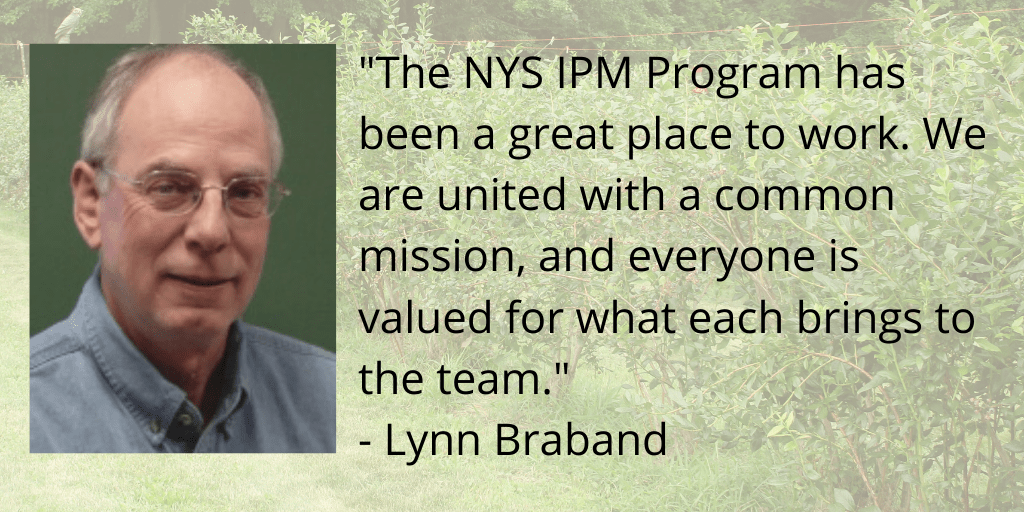
Lynn Braband has a favorite story about how he came to be employed by the New York State Integrated Pest Management Program. It occurred back in 1999 when Lynn’s experience with wildlife management brought him in contact with Director Jim Tette.
Our story is that it was a good day for IPM. Statewide, regionally, nationally, and even internationally, Lynn Braband made things happen through his determination, eagerness to learn and then share, his passion for the environment ,and his reputation as an all-around naturalist and reliable, genial collaborator. We have kudos to share–only a portion of the comments provided before and during Lynn’s VIRTUAL retirement party–but you can’t help but notice our photo header above with some typical Lynn shots. Much like other members of the Community IPM team, on-site scouting for pests was a big part of Lynn’s visits to school districts around the state.
Hang on while we run through SOME of Lynn’s organizational ties, collaborations, presentations and publications:
Starting with Lynn’s Masters in Wildlife Biology, Lynn worked in the wildlife control industry–including his own business–before joining the IPM Program. He is a member of The Wildlife Society, Sigma Xi, American Scientific Affiliation, National Pest Management Association, National Wildlife Control Operators Association, NYS Wildlife Management Association, and the NYS Wetlands Forum. Add to that, his dedicated service on the National School IPM Steering Committee, the International IPM Symposium Program Committee, the IPM Program Work Team, Rochester Healthy Home Coalition, the Statewide School Environmental Health Steering Committee, and foremost, his co-leadership of the Northeast School IPM Working Group.
As you might know, Lynn created and led NY’s Statewide School IPM Committee (above), but his impact on School IPM became much more than statewide. His retirement announcement prompted praise from collaborators across the nation.

Working with school staff around the state led him to applied research on reducing the risk of yellow jacket stings at schools, and keeping geese off playing fields.
Lynn has spoken on bird management, critters on golf courses, reducing bedbugs in childcare centers, and White Nose Syndrome on bats. I counted more than 150 publications, and over 50 public presentations just since 2012!
Two in-depth school surveys across NY were personally guided by Lynn–it was just a part of his deep commitment and relationship-building with building and property managers at individual schools, and with BOCES health and safety officers.

Trust us, or ask one of his colleagues. The incredible impact Lynn had on expanding IPM knowledge and practices was impressive, and we’ll be doing our best to fill in! As for missing Lynn himself, that’s going to take some getting used to. He might even have a story about that!
Brian Eshenaur, NYSIPM: “It was great to see Lynn’s dedication to get IPM principals utilized in school buildings. Though his leadership, he and colleagues throughout the Northeast have created resources to further school IPM goals in the region.”
“In the many years that I have worked with Lynn I’ve always been impressed with his “steadiness” (unlike me) and his work ethic. Lynn you have accomplished much and are an example of a wonderful public servant. I will miss learning from you.” Marc Lame, Indiana University.
Amara Dunn, NYSIPM: “Not only does Lynn do great IPM, but he is a genuinely kind colleague, and his sense of humor has enlivened many meetings.”
“I wish to take this opportunity to recognize Lynn Braband once more for his splendid support of school IPM efforts within his state and nationally. Lynn, you will be missed greatly; you have influenced, encouraged, educated and supported us all over the years.” Dawn Gouge, University of Arizona.
Jennifer Grant, NYSIPM: “Lynn’s steady commitment and patient persistence have been the underpinnings of his success in getting IPM implemented. That approach, along with his vast knowledge of wildlife biology and regulations, as well as his friendly demeanor, all combine to make it easy and enjoyable to cooperate with Lynn. Throughout his career, Lynn has also shown a strong interest in the ethics of science and pest management. He shares his musings with others, causing us all to think. Thanks for everything Lynn!”
“I want others in the IPM network to understand how instrumental Lynn’s work has been, what a legacy he leaves, and how much he will be missed upon retirement.” Lynn Rose, Pollution Prevention and EHS Consultant, Deerfield, Massachusetts.
Jody Gangloff-Kaufmann, NYSIPM: “What a pleasure and an honor to have worked with you for the past two decades, Lynn. I’ve learned a lot from you, most importantly to be more thoughtful and more careful with words. I’ll definitely miss your humor and I will never forget that Albany dinner when Rod Ferrentino sketched out his crimes on the paper tablecloth and had us crying with laughter. I wish you all the best in your retirement from IPM and future adventures.”
Kathy Murray, Maine Dept. of Agriculture: “Lynn has made a lot of good things happen over the past many years.”
Debra Marvin, NYSIPM: “Lynn’s knowledge of wildlife, including his expertise on birds, make him a great IPM facilitator. But his methodical way of approaching problems, and his gentle respect of others, his philosophy and humor make Lynn so admired by his peers, and (lucky for me) a great supervisor and co-worker.”
Joellen Lampman, NYSIPM: “I will miss my dinner time conversations with Lynn, many of which caused fellow diners to wish they had eaten somewhere else that night. But mostly I will miss his stories, his dry sense of humor, and his ability to organize different people with different interests around a common goal statewide, regionally, and even nationally.”
NYSIPM’s Matt Frye chose to honor Lynn in another way: 

